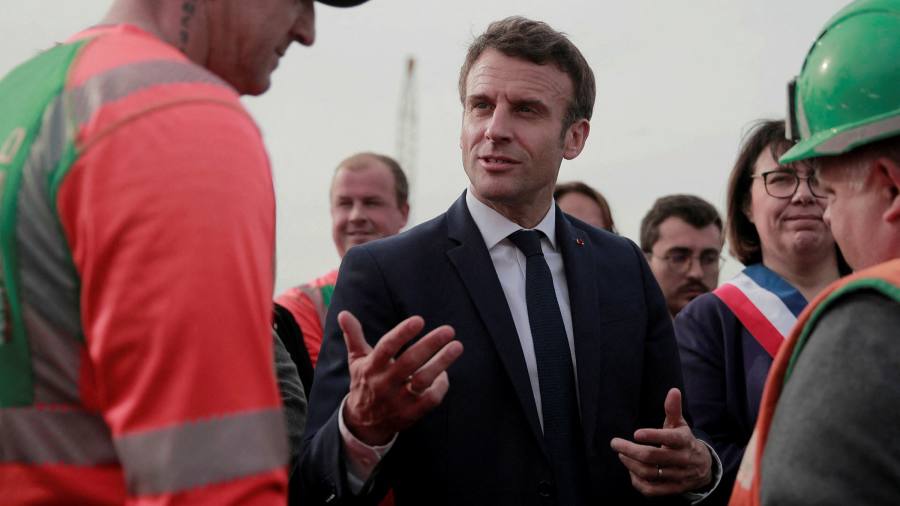Emmanuel Macron has climbed down from a campaign pledge to raise the retirement age in France to 65 as he seeks to win over leftwing and working-class voters in his bid to beat far-right challenger Marine Le Pen in an election run-off.
The president said he would consult unions and other political parties over the pace and timetable of pension reform, raising the possibility that the legal retirement age could be 64 by 2027 instead of his original plan of making it 65 by 2030.
Macron also dangled the possibility of holding a referendum on the unpopular reform of France’s costly pensions system, which is based on a legal retirement age for men and women of 62.
“I am clearly opening the door” to a lower retirement age, he said in an interview with BFM TV on Monday night, adding that “65 years old was not a dogma”.
“I don’t want to divide the country,” Macron added.
The planned pensions reform had been Macron’s most contentious proposal going into the first round of voting on April 10, when he and Le Pen won places in the run-off on April 24. The plan had caused pushback even among his base, campaigners for the president said.
Macron’s opponents, Le Pen and first-round runner-up Jean-Luc Mélenchon of the far-left, had both initially pushed to roll back the retirement age to 60. Le Pen later tweaked her position to make the legal retirement age 62, though people who started working between the ages of 17 and 20 would be able to leave earlier.
On Tuesday, while campaigning in the industrial city of Mulhouse where Mélenchon won the most votes, Macron was peppered with questions about pensions. “If needed, we can have review clauses to reassure people,” he said, suggesting that the retirement age could be re-examined by future governments.
He said this was consistent with his pledge after the election’s first round to unite the French if he were re-elected. “I can’t say on Sunday that I am extending a hand to bring people together and then not move,” he said.
France has one of the highest public sector pension bills among industrialised countries and an early effective retirement age compared with its neighbours. It spends about 13.7 per cent of gross domestic product on pensions, almost double the OECD average, according to the organisation’s data.
Macron tried and failed to revamp the pensions system in his first term and negotiated with unions over a plan that would have rolled 42 different schemes into one and forced some people to work longer. The move sparked months of strikes and protests.
Some aspects of Macron’s planned reform are likely to remain intact, such as doing away with early retirement regimes for state-backed companies. He has also said changes would include exemptions for people in more physical jobs to provide them with earlier retirement and allowing those who start working at a younger age to exit the workforce earlier.
Opponents greeted Macron’s change of tack with scepticism. Manuel Bompard, Mélenchon’s campaign head, told Public Sénat TV on Tuesday that leftwing voters would want a clearer commitment to a referendum on the pensions age. Macron hopes to win over Mélenchon voters before this month’s run-off against Le Pen.
Le Pen rejected the idea that the president would compromise. “I don’t trust Macron at all and especially not 10 days away from the run-off,” she told France Inter radio. “He hasn’t held a referendum in five years . . . he will go all the way with his obsession with retirement at age 65.”
In a March poll published by Les Echos newspaper, 69 per cent of respondents said they opposed Macron’s proposal to raise the retirement age.
Support was higher among voters who backed Les Republicains’ candidate Valérie Pécresse, whose programme included the same reform, in keeping with the conservative party’s focus on fiscal discipline. After her poor showing in the first round vote, her mentor, former president Nicolas Sarkozy, said he would vote for Macron in the run-off because of his “experience” handling crises and an “economic programme that valued work”.
Credit: Source link














